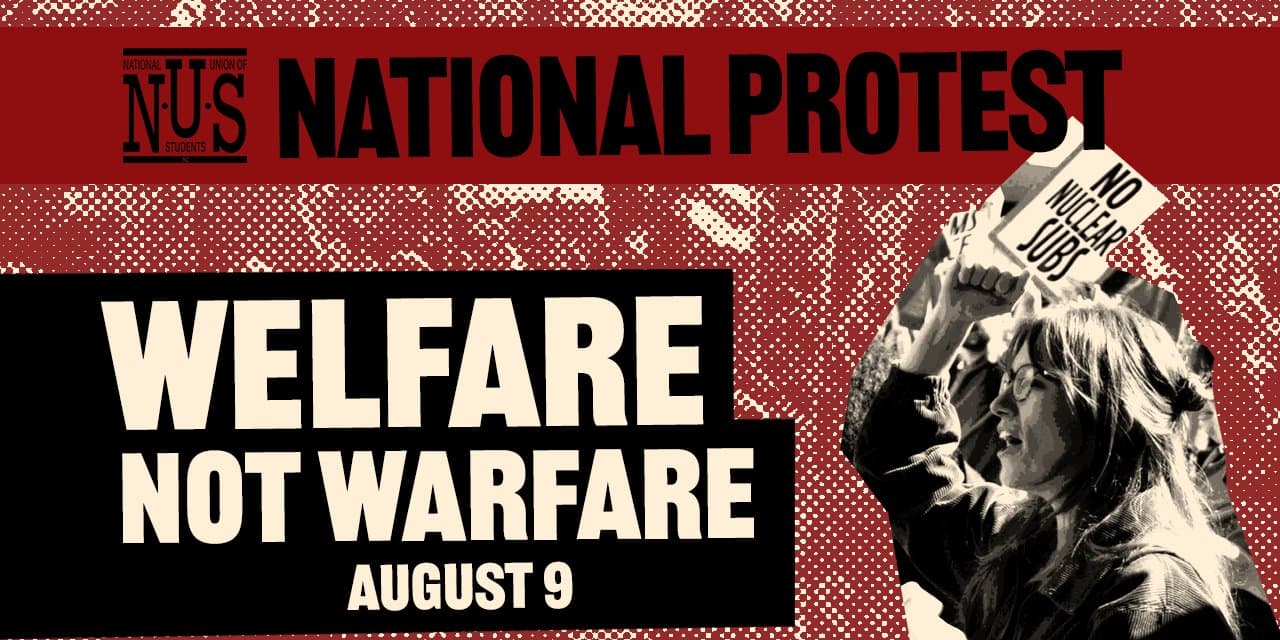University students are getting screwed. Rents are out of control, welfare payments are too low and HECS debt is piling up. Yet, instead of capping rents and raising the rate of JobSeeker, the federal government remains committed to spending $368 billion on nuclear-powered submarines as part of the AUKUS military alliance.
In response, the National Union of Students is holding a nationwide protest on 9 August to demand “Welfare not Warfare”.
The AUKUS alliance is a product of, and is contributing to, escalating tensions between China and the United States. The submarines are designed for long-range use away from Australia—in other words, for aggression. One defence analyst, quoted in the Guardian in July, argued that Australia risks being drawn into a war that “could end in nuclear catastrophe”.
Doomsday concerns aside, it is obscene to spend billions of dollars on military hardware during a cost-of-living crisis. We pay hundreds of dollars a week to live in mouldy houses or tiny shoeboxes run by private student housing providers. Anglicare’s annual rental affordability snapshot, released in April, found just four rental listings across the country that were affordable for someone on JobSeeker, and zero for those on Youth Allowance—not even a room in a share house!
And rents and food prices continue to climb far above increases in wages and allowances.
The $368 billion the Albanese government will spend on submarines would be enough to raise Centrelink payments to at least $88 per day, build more than 1 million public housing units or make education free for all university students.
The submarines are powered by weapons-grade uranium, producing nuclear waste that will likely be dumped on Aboriginal land. In the past, students and trade unions have fought hard to keep Australia nuclear free.
Students have a special responsibility to oppose AUKUS because our universities are complicit in the alliance. While touring the United States earlier this year, Universities Australia chief Catriona Jackson said: “Universities have a major role to play in developing the capability needed to deliver the [AUKUS] project, including through the provision of skilled workers and world-class research and development”.
The federal government has committed $128.5 million to AUKUS-related courses, and Navy Vice Admiral Mark Hammond has called for Australia to build a dedicated institution to train nuclear technology specialists.
Last year, ANU Vice-Chancellor Brian Schmidt made the rather macabre comment that “starting today we need to set a fourteen-year-old schoolgirl on a path to be captain of Australia’s first nuclear-powered submarine”. Flinders University has already formed an agreement with US and UK universities to support the construction of nuclear submarines in South Australia.
This is nothing new; universities have long had ties with the military-industrial complex. Last year, RMIT signed a deal with Elbit Systems, which provides around 85 percent of the drones Israel uses for the surveillance of and attacks against Palestinians. The University of Sydney has not only renewed its partnership with Thales, one of the world’s biggest weapons manufacturers, but the university’s chancellor is chair of Thales Australia.
Our politicians and vice-chancellors are choosing to prioritise war over welfare. Are we going to accept that social services will be neglected while military spending grows? Are we going to accept that corporations like Elbit and Thales will dictate the direction of our education? Or are we going to stand up and demand welfare not warfare?
In the latest outburst of national security hysteria, ASIO spy chief Mike Burgess declared, in a speech on 28 February, that an unnamed former Australian politician had betrayed our beloved country by clandestinely working for an evil foreign spy network—which he called “the A-team”—to provide secret information to a rival power.
Measured by the sheer volume of stuff produced, capitalism is a very successful system. According to World Bank data, in 1960 global gross domestic product (GDP)—which measures the monetary value of goods and services sold—was just under US$1.4 trillion. By 2022 it had risen to $101 trillion. The world’s population has increased a lot in that time, but the volume of stuff produced has increased by far more.
As Israel’s latest brutal war against the people of Gaza drags on, the need to challenge the Zionist state and all those who facilitate its genocidal campaign couldn’t be clearer.
Banyule City Council has become the eighth metro council in the Melbourne area to formally call for an immediate ceasefire in Gaza.
In a monumental betrayal, Melbourne University’s Students’ Council last month voted to rescind a motion supporting the Palestinian struggle for self-determination and the global Boycott, Divestment, Sanctions movement.
The military ordered hundreds of thousands of people into a designated “safe” zone. On reaching it, they were shelled by the army and the air force. The generals said there was another safe zone; if the people kept moving, respite would be found. It wasn’t. Again they were attacked. The scene repeated, but now, corralled onto a tiny stretch of beach and trapped against the ocean, there was no way out.
